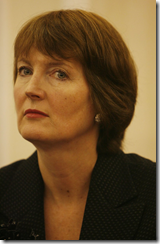At a time when more women should be encouraged to become parliamentary candidates, I fear they may be even more deterred by the severe economic downturn.
Contesting a parliamentary seat is an exhausting task and financially crippling. The immensely dedicated Robert Halfon describes in this article the soaring costs involved which candidates have to meet; he told how he had spent £30,000 in his fight for Harlow – and that was up until December 2005. That figure has probably topped £40,000 now and will continue to soar until the election is held. These kind of figures are not encouraging for women who are often first in line for redundancy.
I was thinking about this after reading a thought provoking report by the Equality and Human Rights Commission entitled Sex and Power 2008 which states that it would take around 200 years – another 40 elections – to achieve an equal number  of women in Parliament. That is a very sad figure in this day and age of women’s equality.
of women in Parliament. That is a very sad figure in this day and age of women’s equality.
The Commission is monitoring the annual index of women in positions of authority and influence in Britain and believes that the emerging trend is one of reversal or stalled progress, with a few exceptions in the arts and voluntary sectors.
It mentions how only 19.3% of our MPs are presently women, and says a snail could crawl the entire length of the Great Wall of China in 212 years, just slightly longer than the 200 years it will take for women to be equally represented in Parliament. I love data, and these figures certainly focus the mind on what seems insurmountable!
This is an area which Labour’s deputy leader Harriet Harman should be taking a lead on as Minister for Women and Equality. I find it shocking that the United Kingdom lags so far behind other countries in being represented by women politicians. In fact, the UK currently ranks 70th and is outperformed by Rwanda, Afghanistan and Iraq in terms of women’s representation.
Are British women simply not interested in taking a pivotal role in political life, or are they deterred by the selection process, financial costs and gruelling campaigning which it entails? Will it always be “jobs for the boys” in Westminster village?

The prospect of Harriet Harperson leading the country is scary!
I have seen many working mums (including family members) taking over the role as leading breadwinner in the current times. Being a parliamentary candidate is a voluntary job and the voluntary services are being hit hard as people have less time on their hands. This is an issue that affects not just aspiring politicians but grass routes vital charities as well.
It is not money that motivates me as a parliamentary candidate but the desire to make a difference over a wide range of issues.
With the Harpie and Jackie smith as examples of those who make it I’m not sure I’m that bothered. As so many MP’s just do what the party tells them we could put a monkey in parliament and trust he wouldn’t fiddle their expenses.
JL P
I don’t think that’s a realistic proposition.
Rob Halfon is a great guy -I have known that for many years. I first met him in the eighties when we campaigned together.
Now this has made me really depressed Ellee. 200 years! That is appalling and I really hope it proves false.
In the last election every party fielded a woman candidate so we were assured of a female member of parliament.
You are right – and they need helpful husbands/families to help with leafleting and to put on smiling faces at all the fund raising events
Mrs Weggis tells me its because women [wopersons?] are generally too intelligent to enter politics and have much better and more rewarding things to do with their lives.
Doesn’t say much for the ones we’ve got does it?
Yeah it always mystifies me too and it can’t all be explained by lack of support (from wives/husbands). But it is certainly not something I would ever fancy doing.
People, women in particular it seems, do slag off women politicians, focusing on their clothes and hair and all that rubbish. Women seem to have a problem with supporting other women to succeed – they play the jealousy/knock them down game in a way that men are less likely to. I’m not saying it is down to other women (I’m sure all the usual male-inspired barriers occur) but other women most certainly do not help.
[…] The economic recession and women political candidates […]